Aspirin may reduce the risk of severe coronavirus symptoms, according to a study by George Washington University on Thursday.
The study, published in the monthly peer-reviewed medical journal Anesthesia & Analgesia, found that low doses of the low-cost and commonly used drug may have lung-protective effects and lower the risk of going to intensive care units (ICU), or even death, from the coronavirus.
Patients with the virus who used aspirin had a 40% less chance of needing a mechanical ventilator in the ICU, according to the study conducted with 400 patients from March to July 2020.
Aspirin use decreased the risk of mechanical ventilation by 44% and lowered ICU admissions by 43%, while in-hospital mortality fell 47%, the study showed.
"As we learned about the connection between blood clots and COVID-19, we knew that aspirin -- used to prevent stroke and heart attack -- could be important for COVID-19 patients,” said Dr. Jonathan Chow who teaches anesthesiology and critical care medicine and is the director of the Critical Care Anesthesiology Fellowship at the School of Medicine and Health Sciences.
